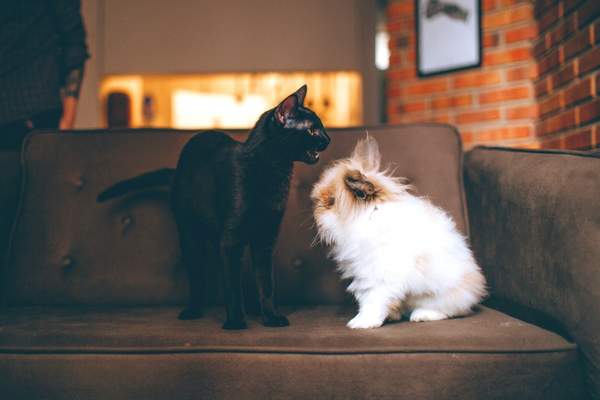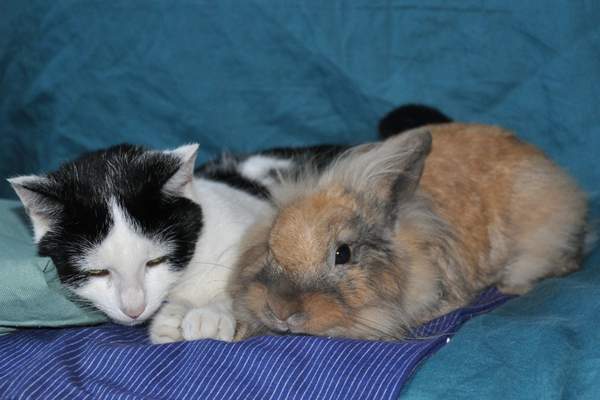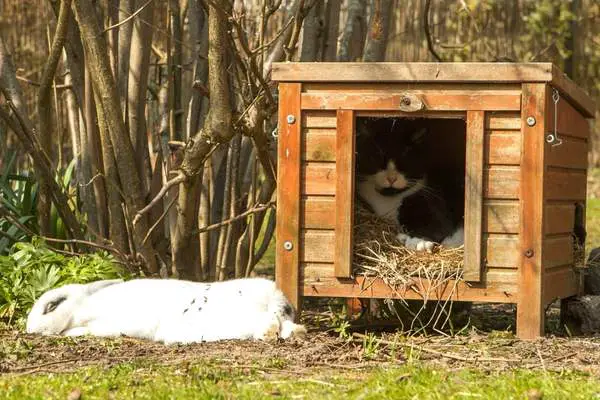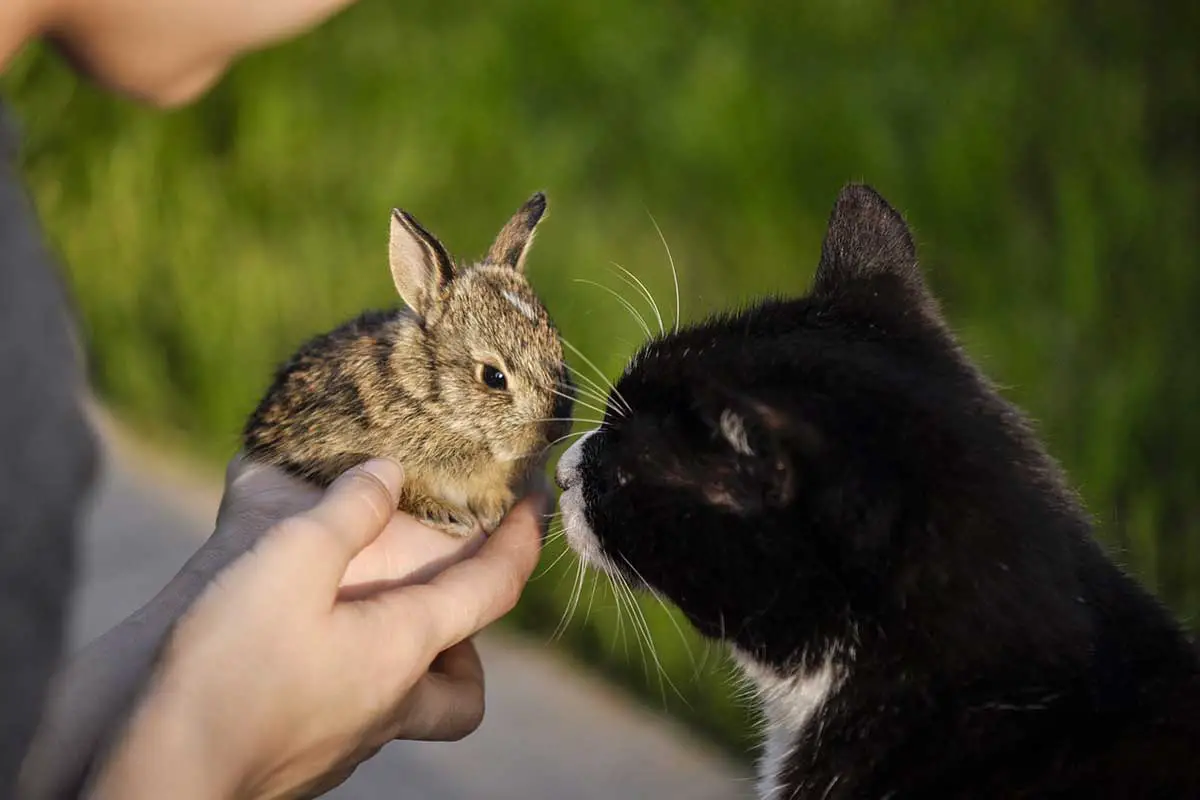Anyone who has rabbit companions in their home knows that interpreting the behavior of these furry fellows can sometimes be puzzling. In what most would think is a predictable dynamic between a predatory cat and a meek little rabbit, watching your rabbit turning the tables on its feline friend can be confusing, if not a little entertaining, indeed.
So, why is my rabbit chasing my cat? The most probable explanation for this normal behavior is that your rabbit is quite territorial by nature, and likely is encouraging its feline housemate to stay out of its space.
So, your rabbit is territorial—now what? In this article we will discuss what it means to have a territorial rabbit and how that affects its behavior, your rabbit’s hierarchical nature, and potential stressors your friend may suffer from sharing space with a cat.
Our Territorial Friends

Rabbits are typically gentle, docile, and quite friendly pets, so it often comes as a surprise to their human companions to find out how very territorial they are, both in the wild and at home. As such, rabbits view different spaces in different ways.
They have their own space that they value greatly, and they acknowledge the difference between that space and a warren-mate’s (or housemate’s) space. They also recognize when an area is off-limits, but very much enjoy testing those limits.
While your rabbit companion marks off its own territory and acknowledges yours, that of the cat, and any other creature in the home, it will also test the physical boundaries of those spaces.
If you see your rabbit charging, bumping, or even just peering intently into a space from which they know they are barred, it is likely testing boundaries to see if today is the day you allow them to enter!
This desire to push or test boundaries may partially be what is driving the chasing behavior—your curious companion could simply be trying to ascertain if it can enter your cat’s personal space.
Furthermore, rabbits will mark their territory to establish their own boundaries. This explains why, even though you have a litter-trained bunny, you still find pellets in odd places. Additionally, if your furry friend rubs its face on things, or you, they are marking their territory with scent glands located beneath their fuzzy chins.
Not to worry—our human olfactory senses cannot detect this scent, and it does not leave any visible marks. In fact, this kind of marking should be encouraged as it makes your companion feel relaxed and more at home, which in turn helps mitigate further territorial behavior.
If your rabbit feels as though your cat is infringing a little too much into their sacred space, it likely will be compelled to give chase. Domestic cats are not usually accustomed to such behavior, as they are solitary in contrast with rabbits, who live in groups called warrens in the wild.
Because of this, cats typically cannot be bothered with addressing the behavior, so they will usually choose to run or seek sanctuary in a high place like your nice dining room chairs. Keep in mind, however, that depending on your cat’s personality, it may choose to retaliate, so be sure to always supervise your companion’s play dates.
If your rabbit’s bossy behavior does not seem territorial, perhaps it is trying to establish its place in your home’s hierarchy, possibly through activities like rabbit chasing cats.
The Hierarchy of Your Home Warren

As mentioned earlier, rabbits in the wild live in groups called warrens, and they are quite social. Like many other group or pack animals, wild rabbits exist in a social hierarchy, consisting of family groups at various “levels,” the highest of which are typically the strongest, and most capable of producing lots of healthy little bunnies.
In terms of this social hierarchy, rabbits will often test each other the way they test physical boundaries. Wild rabbits “challenge” each other with behaviors such as mounting (male and female), nipping, or the now-familiar chasing. Domestic rabbits still possess the drive to exist within a hierarchy and to challenge the status quo.
If your home menagerie consists of both bunnies and cats, your rabbit likely sees the cat as part of its “warren” and will naturally feel compelled to try and figure out where it stands in your home’s hierarchy.
Since you most likely have discouraged or otherwise redirected aggressive behavior such as nipping or fur-pulling, chasing probably seems to your rabbit like the best way to challenge your cat for what it may see as a higher position in the group.
This behavior is not necessarily bad; however, if your rabbit becomes dissatisfied with the results of its challenges and tries to escalate, or if your cat decides it is tired of running and retaliates, the ensuing altercation could result in injuries.
Therefore, it is best to try and make both pets feel as comfortable with each other as possible through supervision, training, redirection, and occasional separation (allow bunny to sleep in its own cage while your cat snoozes in another room.)
If you suspect that your rabbit’s ambition to climb the hierarchical ladder in your home is not driving its behavior, it might be time to consider some other alternatives.
Potential Stress From Predator/Prey Dynamic
Another plausible, albeit less likely, explanation for your rabbit’s chasing behavior could be that it is acting out on stress built up from cohabitation with a predatory animal. In the wild, rabbits are considered prey animals, while cats are natural-born predators.
This rather striking contrast may make it seem as though having both cats and rabbits in your home might not be the best idea—but do not fear. Despite their cold reputation, domestic cats easily train to overcome their basic instincts regarding how they view “prey animal” pets.
While a cat may be able to overlook its own prey drive, a rabbit would not be able to overcome its instincts quite so easily. In the wild, rabbits rely heavily on their sharp senses, speed, and agility to evade predators.
These senses did not dull much with domestication and sharing a space with what it perceives as a predator may lead to your rabbit being wary and overly alert for prolonged periods of time. This could lead to a buildup of stress which can cause anxiety, aggression, and health problems like fur loss, lethargy, and even illness.
Although rabbits primarily depend on the “flight” part of the fight-or-flight instinct, our cotton-tailed companions are far more capable of defending themselves than we typically give them credit for.
If your rabbit feels on-alert all the time or finds itself whisker-to-whisker with your cat a little too often for its liking, it may attempt to turn the tables and chase your cat out of its space. This behavior could also be viewed as territorial, but it is subtly different due to the driving cause in this case—stress or fear.
Observe your rabbit’s mannerisms and behavior while it is in the presence of your cat to determine if your rabbit is acting out of fear. These are some signs you should be particularly aware of:
- Crouching or hiding
- Restlessness
- Uncharacteristic squealing or grunting
- Heavy breathing
- Thumping the ground with rear feet
This list is not all-inclusive, but if your rabbit demonstrates any of these behaviors in the presence of your cat, especially prior to the chasing behavior, it may be anxious or fearful of what it thinks is a possible predator.
You can help allay your bunny’s fears by supervising their interactions with the cat, redirecting the rabbit when it starts to exhibit fearful behavior, and having a lot of patience by allowing an extended warming-up period between your two companions.
Allow your pets time to interact while your rabbit is safely inside its cage. They can see and hear each other but your rabbit, being within its valued personal space we discussed earlier, will feel like there is nothing to fear from the cat. This process may be lengthy, but in the end, it will be worth it for happy, healthy furry friends.
Playfulness and Social Skills

If both your rabbit and cat appear happy, healthy, and not like they are competing for space or position, one more possibility could be that your rabbit may merely be trying to play with your cat. Companion animals all have their own unique personalities and rabbits are no different.
Given the social nature of your bunny and its predisposition to group living, chasing behavior may be your furry friend’s way of trying to bond with your cat. Domestic rabbits that belong to small living groups in a home sometimes have trouble developing the social skills they would otherwise learn in a large warren consisting of family groups in the wild.
This means that although your bunny may be slightly behind the social learning curve, there is absolutely nothing to worry about.
Conclusion
If your rabbit is chasing your cat, it is likely acting on its base, somewhat bossy instincts of protecting its territory and its position in your home warren against your aloof feline. Be on the lookout for signs of stress or fear in your rabbit, but rest assured your cotton-tailed friend may just be acting extra playful or is trying to hone its social skills.
This behavior is nothing to worry about but do supervise playtime between your rabbit and your cat to ensure both of your friends are having fun and safe interactions in your home.

